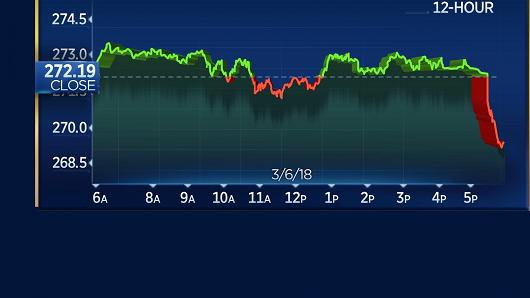
- Dow Jones industrial average futures indicated an open of more than 300 points lower.
- Industrials stocks Caterpillar and Boeing fell more than 2 percent in extended trading.
- Gary Cohn, former Goldman Sachs president and COO, was seen as supporting more business-friendly policies
U.S. stock index futures pointed to a sharply lower open on Wednesday after news that White House chief economic advisor Gary Cohn has resigned.
Dow Jones industrial average futures indicated a drop of more than 300 points at the open, while the S&P 500 futures implied a decline of about 1 percent. Industrials stocks Caterpillar and Boeing fell more than 2 percent in extended trading.
Cohn, former Goldman Sachs president and COO, was seen as supporting more business-friendly policies, so his resignation was especially jarring in the wake of President Donald Trump’s surprise announcement of tariffs on steel and aluminum imports on Thursday.
“I think this is definitely a bigger deal than some of the other departures, due to Cohn’s reputation as proponent of Wall Street, said Dan Deming, managing director at KKM Financial. “Short-term I believe it would increase concerns of an increased probability of a trade war escalating.”
However, he and other analysts noted that it was too early to determine whether there will be lasting damage to market psychology.
The U.S. dollar index extended losses, trading 0.5 percent lower near 89.56. Gold futures were trading near $1,333.60.
U.S. stocks closed higher Tuesday, recovering from earlier concerns about a possible trade war.
The major averages declined earlier in Tuesday’s session after Bloomberg News reported, citing sources, that Trump was convinced Cohn would leave the administration if the tariffs proposed by the president were implemented.
“The statement was, if Trump went forward with these tariffs, Cohn would leave. It’s tempting to think that since Cohn is leaving, they’re definitely coming through. … I think that’s a bit premature,” said Nathan Sheets, chief economist at PGIM Fixed Income.
“At a minimum, though, this is a powerful voice inside the White House that will not be there arguing against [tariffs],” Sheets said. “Therefore, the probability may be higher that they go through.”
Later Wednesday, investors will be inundated with a raft of economic data and comments by Federal Reserve speakers.
On the economic front, mortgage applications are set to be released at 7 a.m., followed by the closely watched monthly private-sector jobs report from ADP at 8:15 a.m. Readings on fourth-quarter productivity and January international trade are due out at 8:30 a.m.
William Dudley, president and CEO of the Federal Reserve Bank of New York and Raphael Bostic, president and CEO of the Atlanta Fed, are both expected to speak later Wednesday












